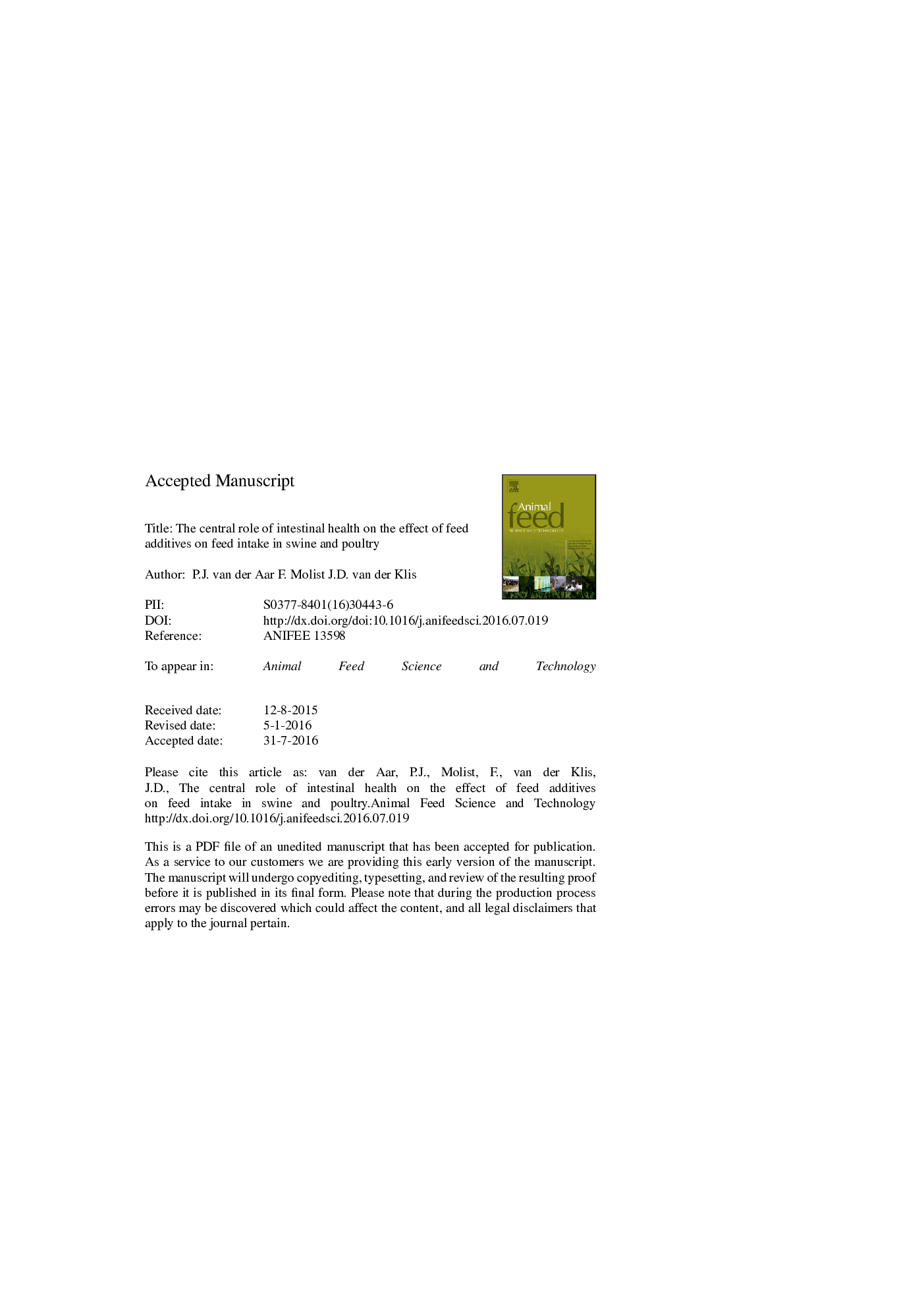| کد مقاله | کد نشریه | سال انتشار | مقاله انگلیسی | نسخه تمام متن |
|---|---|---|---|---|
| 8491100 | 1552353 | 2017 | 30 صفحه PDF | دانلود رایگان |
عنوان انگلیسی مقاله ISI
The central role of intestinal health on the effect of feed additives on feed intake in swine and poultry
ترجمه فارسی عنوان
نقش مرکزی سلامت روده بر تأثیر افزودنی های خوراکی در مصرف خوراک در گوشت خوک و مرغ
دانلود مقاله + سفارش ترجمه
دانلود مقاله ISI انگلیسی
رایگان برای ایرانیان
کلمات کلیدی
MCFAADGFCRC. perfringensSCFAIGF-1ANFTEERGITTHRADFIHSCASE. coliLPSiPECStress - استرس یا فشار روانیAmino acids - اسید آمینه یا آمینو اسیدShort-chain fatty acids - اسیدهای چرب کوتاه مدتEscherichia coli - اشریشیا کُلیFeed additives - افزودنی های خوراکیFermentation - تخمیر threonine - ترئونینGastrointestinal tract - دستگاه گوارشDON - دونIntestinal health - سلامت رودهAnti-nutritional factors - عوامل ضد تغذیهInsulin-like growth factor - فاکتور رشد مانند انسولینFumonisin B1 - فومونیزین B1Lysine - لیزینLYS - لیستlipopolysaccharide - لیپوپلی ساکاریدaverage daily gain - متوسط افزایش روزانهTrans-epithelial electrical resistance - مقاومت الکتریکی Trans-epithelialAverage daily feed intake - میانگین مصرف خوراک روزانهMicroflora - میکرو فلوراfeed conversion ratio - نسبت تبدیل خوراکClostridium perfringens - کلوستریدیوم پرفرنژنس
ترجمه چکیده
مواد افزودنی معمولا به رژیم های غذایی حیوانی افزوده می شود تا باعث تحریک عملکرد تولید و بهبود رفاه و سلامت بویژه در دوره های شدید زندگی شوند. عملکرد بالاتر تولید به طور کلی ناشی از مصرف غذای بالاتر، هضم بهتر و جذب مواد مغذی، بهبود سلامت روده یا مقاومت در برابر چالش های سیستماتیک و یا ترکیبی از آنها خواهد بود. بسیاری از مواد افزودنی خوراکی اثر مستقیمی یا غیرمستقیم روی بهبود یکپارچگی اپیتلیوم روده و مقدار سوبسترا قابل تخمک برای میکرو فلور روده دارند. مکانیسم که این تاثیرات بر میزان مصرف غذا تأثیر می گذارد، به طور کلی مورد بحث قرار می گیرد. با توجه به طیف گسترده ای از انواع اقدامات که توسط مواد افزودنی خوراکی می تواند تحریک مصرف غذا (با بهبود یکپارچگی روده، جلوگیری از آسیب روده، جبران برای نیازهای تغذیه ای اضافی برای پاسخ ایمنی، کاهش مقدار سوبسترا برای میکرو فلور یا جلوگیری از التهاب) و یا کاهش مصرف خوراک (با افزودن آنزیم های خوراکی برای بهبود ارزش غذایی انرژی یا عدم مصرف غذا به علت مشکلات ارگانولپتیک همراه با افزودن اسید های چرب متوسط و اسیدهای آلی در سطوح بالای درج)، اثرات کلی آن بسیار دشوار است. علاوه بر این، از آنجا که افزودنی های مختلف ممکن است تا حدی اثر مشابهی داشته باشند، می توان انتظار داشت که این اثرات افزایشی نباشد. اثرات مستقیم یا غیرمستقیم مواد افزودنی خوراکی خاص مانند پروتئین و پیشبیتیک، اسیدهای چرب متوسط زنجیره ای، گیرنده های میکوکوتوکسین، اسید های ارگانیک، اسیدهای آمینه، امولسیفایرها، آنزیم ها، آنتی اکسیدان ها، ترکیبات فیتوژنیک بر تاثیر مصرف خوراک در گونه های گوشت خوک و مرغ به صورت جداگانه مورد بحث قرار می گیرند .
موضوعات مرتبط
علوم زیستی و بیوفناوری
علوم کشاورزی و بیولوژیک
علوم دامی و جانورشناسی
چکیده انگلیسی
Additives are commonly added to animal diets to stimulate production performance, and to improve welfare and health especially in stressful periods of life. The higher production performance generally will be a result from a higher feed intake, better digestion and absorption of nutrients, from improved intestinal health or resilience against systemic challenges or a combination thereof. Many feed additives have a direct or indirect effect on improving the integrity of the intestinal epithelium and on the amount of fermentable substrate available for the intestinal microflora. The mechanism by which these effects influence feed intake are discussed in general terms. Due to the wide variety of modes of actions by which feed additives can stimulate feed intake (by improving intestinal integrity, preventing intestinal damage, compensating for additional nutritional requirements for immune response, reducing the amount of substrate for the microflora or preventing inflammation) or reduce feed intake (by the addition of feed enzymes to improve dietary energy value or feed refusals due to organoleptic problems associated with the addition of medium chain fatty acids and organic acids at high inclusion levels) it is difficult to conclude on general effects. Moreover, since different additives might partially have similar effects, it can be expected that these effects are not additive. The direct or indirect effects of specific feed additives such as pro- and prebiotics, medium chain fatty acids, mycotoxin binders, organic acids, amino acids, emulsifiers, enzymes, anticoccidials, phytogenic compounds on affecting feed intake in swine and poultry species are separately discussed.
ناشر
Database: Elsevier - ScienceDirect (ساینس دایرکت)
Journal: Animal Feed Science and Technology - Volume 233, November 2017, Pages 64-75
Journal: Animal Feed Science and Technology - Volume 233, November 2017, Pages 64-75
نویسندگان
P.J. van der Aar, F. Molist, J.D. van der Klis,
